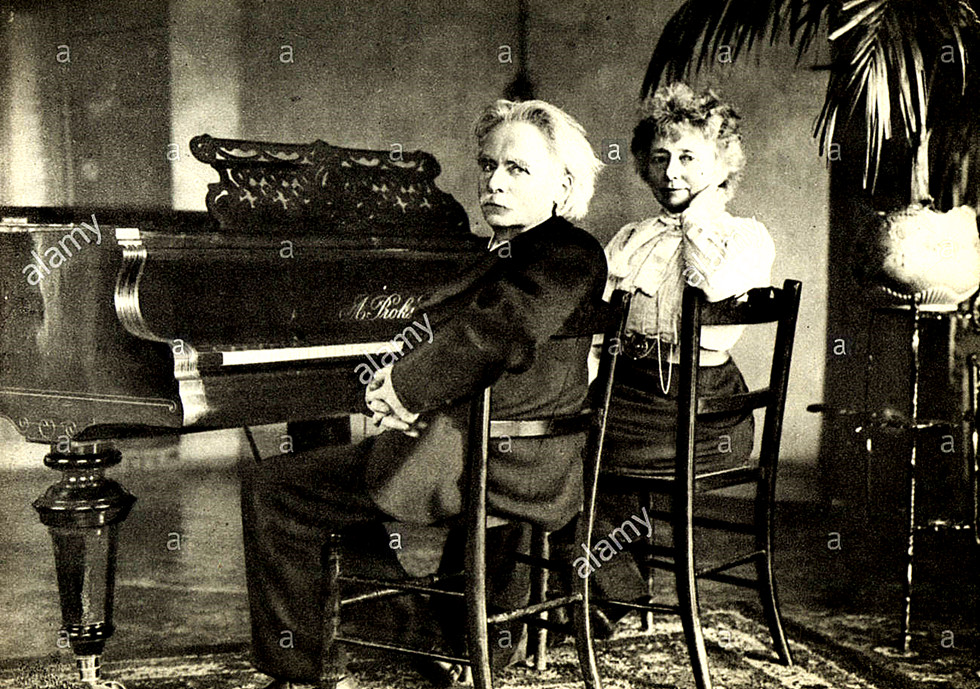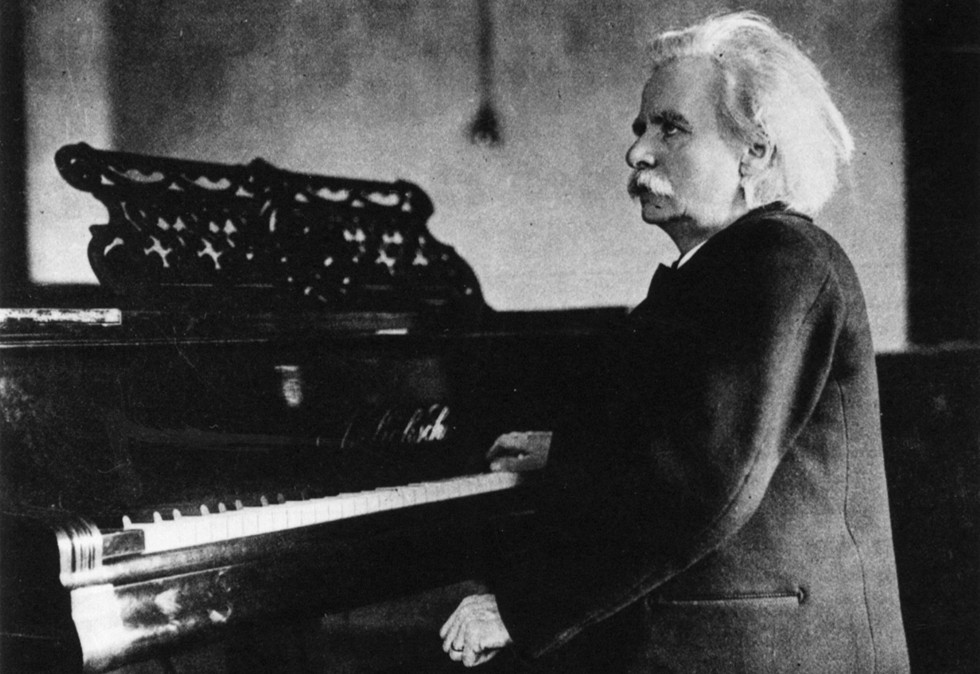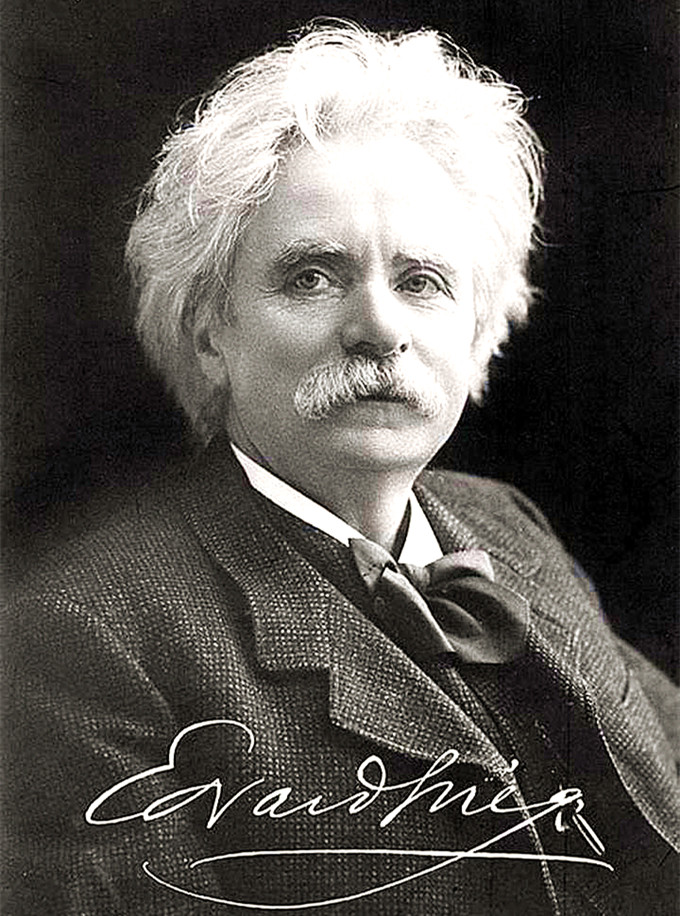|
||||||||||||||||||||||||||
 |
 |
|||||||||||||||||||||||||
|
|


|
|||||||||||||||||||||||||
|
|
|
||||||||||||||||||||||||
| 爱德华·格里格(Edvard Grieg,1843年—1907年) | |||||||||||||||||||||||||
《格里格a小调钢琴协奏曲》卡蒂娅-布尼亚季什维莉 (2018 BBC逍遥音乐节) |
|
||||||||||||||||||||||||
|
|
|||||||||||||||||||||||||
|
音乐历史上的今天
1874年1月23日,挪威戏剧大师易卜生邀请爱德华·格里格( Edvard Grieg)为《培尔·金特》(Peer
Gynt)谱写配乐。如果没有配乐,观众恐怕受不了这话剧。 格里格是一位挪威民族音乐家,他的作品深深植根于祖国的土壤,始终贯串着祖国的主题,举凡挪威山川的秀丽景色、农村日常生活的习俗和宗教仪式、民间神话的荒诞不经的想像都有所反映;他很少直接引用民歌素材,但是他的风格和技巧都是在挪威民间音乐语言的基础上发展出来的,因此他的作品总是散发着挪威民间音乐固有的芳香。格里格不曾写过歌剧,但为戏剧所写的一些配乐却脍炙人口;他的大型管弦乐作品也只有《钢琴协奏曲》比较闻名。格里格主要写作抒情性的钢琴曲以及声乐曲,他的小型作品特别富有诗意,为此,德国钢琴家、指挥家封·彪罗曾正确无误地把他称为“北方的肖邦”。
|
|
||||||||||||||||||||||||
 |
|||||||||||||||||||||||||
| 格里格和夫人(Edvard Grieg ) | |||||||||||||||||||||||||
|
Today in music
history On January 23, 1874, Norwegian theater master Ibsen invited Edvard Grieg to compose the score for "Peer Gynt."The audience would not be able to bear the play without a soundtrack. Edvard Grieg (1843 -- 1907) was a Norwegian composer and a representative of Norwegian folk music in the second half of the 19th century.Grieg was born on June 15, 1843, to a merchant family in bergen. He died in the same place on September 4, 1907.At the age of 6, I learned piano from my mother and received music enlightenment education.Recommended by the famous violinist o. bull, he studied at the leipzig conservatory of music from 1858 to 1862.After graduation, he held his first concert in bergen.From 1863 to 1866, he worked in Copenhagen, the capital of Denmark, and co-founded the "utepi" music club with the Norwegian folk music pioneer, musician r. norak, etc., to create and introduce the folk music of the Scandinavian countries. Grieg is a Norwegian national musician. His works are deeply rooted in the soil of his country and always stick to the theme of his country.He rarely quotes folk music directly, but his style and technique are based on the Norwegian folk music language, so his works always exude the inherent fragrance of Norwegian folk music.Grieg had never written an opera, but some of the music he had written for plays was very popular.His only major orchestral work is the piano concerto.Grieg wrote mainly lyrical piano and acoustic music, and his small works were so poetic that the German pianist and conductor von piot correctly called him the Chopin of the north. Video of the day: katia bunyateschvili performs piano concerto in gregor a minor (2018 BBC promenade) dudamel, known as "Mozart on the podium", conducts Richard strauss's symphonic poem Don Juan op. 20.From this piece, we can see his importance in the romantic period, especially in musical performance technology. The latest listening methods are constantly upgrading, and the best five-in-one combination like today's is really hard to find. First, excellent works; second, outstanding conductors; third world rare first-class symphony orchestra; fourth, modern concert halls with excellent acoustics; fifth, best audio and video recording.Without the latter, everything is casting pearls before swine. |
|||||||||||||||||||||||||
 |
|||||||||||||||||||||||||
| 爱德华·格里格 | |||||||||||||||||||||||||
【格里格】『培尔·金特』组曲-第一号 第二号 Op.46 Op.55 |
|||||||||||||||||||||||||
培尔·金特
格里格应邀为易卜生的诗剧 《培尔·金特》
所写的配乐,完成于1874至1875年间,但他从配乐中选编的两套组曲(各分四段),却到1888和1891年才先后编出。这两部组曲都是曲作者格里格的代表作品。戏剧《培尔·金特》
虽然不是挪威著名文学家、剧作家易卜生的代表作,但在作者的全部剧作中却占有相当重要的地位。易卜生的诗剧《培尔·金特》大量采用象征和隐喻的手法,塑造了一系列扑朔迷离的梦幻境界和形象,剖析了当时挪威上层社会的极端利己主义,同时又触及了当时世界上的许多重大政治事件。
关于易卜生的这部诗剧, 格里格曾在他《第二组曲》的扉页概括作了这样的说明:“培尔·金特是一个病态地沉溺于幻想的角色,成为权迷心窍和自大狂妄的牺牲品。
年轻时,他就有很多粗野、鲁莽的举动, 经受着命运的多次捉弄。培尔·金特离家出走,在外周游一番之后,回来时已经年老,而回家途中又遇翻船,使他像离家时那样一贫如洗。在这里,他年轻时代的情人,多年来一直忠诚于他的索尔维格来迎接他,他筋疲力尽地把脸贴在索尔维格的膝盖上,终于找到了安息之处。”
尽管第二组曲中的 《索尔维格之歌》确属杰作,但总的说来还是《第一组曲》更为流行。
选入两套组曲的八首乐曲,只按音乐的要求编排,完全不受原剧情节发展的牵制。
◆第一组曲分为四段:
◇晨景
原为诗剧第四幕第五场的前奏曲。主人公远涉重洋,前往美洲去贩运黑奴,往中国贩运偶像,一时成了富商。这时,他来到摩洛哥,一天清晨,在一个山洞前面,他用独白披露自己的内心活动。但这段音乐所描绘的并非是炎热的沙漠,而更像北欧清晨静谧清新的抒情画面。乐曲具有牧歌风格,由单一的田园风味主题加以自由而精心的发展构成(片段1、片段2)。
◇奥丝之死
◇安妮特拉
选自诗剧第四幕第六场。在沙漠绿洲中,一座阿拉伯酋长的帐篷里,酋长的女儿安妮特拉正用舞蹈对培尔·金特献媚。这段音乐描绘的正是这一场面,但严格地说,它远远超过了作为配乐的作用,因为它直接参与戏剧的内容,成为诗剧中密不可分的组成部分(片段3)。
◇妖王宫中
原为诗剧第二幕第六场的前奏。主人公在山中与妖王之女调情,并在妖王的威胁之下同妖女结了婚。这一场点出全剧的主题,即人与妖之间的区别,是最具幻想性的第二幕的真正核心(片段4)。
◆第二组曲也分四段:
◇悲叹
原为第二幕之前的幕间曲。 培尔·金特
在乡村的一次婚礼上,拐走了朋友的新娘英格丽德,把她带到山上,玩弄够了又将她遗弃,说他真正爱的是索尔维格。这段音乐以英格丽德为主要形象,表现出一种非常激动和无奈的情绪,堪称为一首奇妙的挪威哀歌。
◇舞曲
原为第四幕中阿拉伯舞蹈场面的配乐。乐曲带有女声合唱,意欲描绘东方的“异国”情调。
◇培尔金特
原为第五幕的前奏曲。在第五幕中,主人公的形象已经是一个须发斑白的老人,他站在返回挪威的轮船上衣衫褴褛,神情冷酷。
◇索尔维格
|
|||||||||||||||||||||||||
|
Peer gynt Grieg was asked to write the score for Ibsen's poem "peiergen", completed between 1874 and 1875, but he did not compose two suites (each in four parts) from the score until 1888 and 1891.Both suites are representative works of the composer Greg.Although it is not the representative work of Ibsen, the famous Norwegian writer and playwright, the play peiergen plays an important role in the author's plays.Ibsen's poem "peiergen" USES symbols and metaphors to shape a series of complicated dreamlike states and images, analyzes the extreme egoism of the upper class in Norway at that time, and touches many major political events in the world at that time.On the title page of his suite ii, grieg sums up Ibsen's poetic drama as follows: "pei er gent is a character who is morbid in his fancy, the victim of power obsession and arrogance.When he was young, he had many wild and rash ACTS, and had suffered many a trick of fate.After a long journey away from home, he came back old, and a boat capsized on his way home, leaving him as poor as when he left home.Here the lover of his youth, solveg, who had been faithful to him for so many years, met him, and he laid his face on solveg's knee, exhausted, and found his rest."Although solveg's song in the second suite is a masterpiece, the first suite is generally more popular.The eight pieces selected from the two suites are arranged according to the musical requirements and are not restricted by the plot development of the original play. ◆ the first suite is divided into four sections: His morning scenery The prologue to act 4, scene 5.The hero travels to America to trade black slaves and idols to China. He becomes a rich merchant for a while.He arrived in Morocco, and one morning, in front of a cave, he revealed his inner life in a monologue.But this piece of music depicts not the hot desert, but more like the northern Europe morning quiet fresh lyrical picture.The music has an idyllic style, consisting of a single pastoral theme with free and careful development (fragments 1, 2). ◇ death of oz When his mother, ossie, was dying, pelle gent came back. He recalled her childhood and accompanied her to the great feast in heaven with fanciful stories.It was a very moving scene in the whole play.Grieg's score is so solemn and solemn that it could be called a elegy or a funeral march. ◇ Annette From act 4, scene 6 of the poetic drama.In the tent of an Arab sheik in a desert oasis, the sheik's daughter, anitra, is dancing up and down to pei 'r gent.This piece of music depicts exactly this scene, but it is, strictly speaking, far more than a soundtrack, because it is directly involved in the content of the play and becomes an integral part of the poetic drama (fragment 3). ◇ in the demon palace It was the prelude to act ii, scene 6.The hero flirts with the demon king's daughter in the mountains and marries her under the threat of the king.This scene highlights the theme of the whole play, that is, the difference between human and demon, which is the real core of the most fantastical second act (segment 4). ◆ the second suite is also divided into four sections: Cardiac wail It was the interlude before the second act.At a wedding in the country, pere genter abducts his friend's bride ingrid, takes her to the mountains, plays with her enough and then abandons her, saying that he really loves solvig.This piece of music with ingrid as the main image, showing a very excited and helpless mood, can be called a wonderful Norwegian elegy. His dance Originally the soundtrack for the Arab dance scene in act iv.The music, with a female chorus, is intended to depict the "exotic" atmosphere of the east. ◇ pelgent The prelude to act 5.In act five, the hero is already a grizzled old man standing on a ship returning to Norway in shabby clothes and looking grim. ◇ solveg Original score for the poem drama act 4, scene 10.Sitting in front of a hut in a forest in the north of Norway, waiting for the return of peir-gente, solveg sings: "winter goes to spring, and again and again, and one day you will come back."The piece of music included in the suite has been adapted by the author into a purely instrumental piece, without the original singing part.The melody is very beautiful, with the first theme of sadness (fragment 5) and the second theme of hope (fragment 6) in sharp contrast. It is a famous composition in the whole suite and one of grieg's most successful compositions. |
|||||||||||||||||||||||||
 |
|||||||||||||||||||||||||
| 钢琴家卡蒂娅-布尼亚季什维莉 (Khatia Buniatishvili) | |||||||||||||||||||||||||
|
卡蒂雅·布尼亚季什维莉(Khatia
Buniatishvili),1987年6月21日出生于格鲁吉亚的首都第比利斯,法国籍格鲁吉亚裔钢琴演奏者
[1] 。 2003年,获得霍洛维茨国际钢琴比赛特别奖。2008年,获得鲁宾斯坦国际钢琴比赛第三名 [2] ;同年,首次在卡内基音乐厅演出,正式开启演奏生涯 [3] 。2009年,与小提琴家吉顿·克莱默合作,在维也纳金色大厅演出。2010年,获得伦敦艺术家大奖 [4] 。2011年,发行个人首张专辑《弗朗茨·李斯特》;同年,被英国广播公司评选为2009-2011年度新生代艺术家,并被维也纳爱乐协会评为音乐季闪亮之星 [5] 。2012年,与巴黎管弦乐团合作录制肖邦作品专辑;同年,获得古典回声奖“最佳新人奖 |
|||||||||||||||||||||||||
|
Khatia Buniatishvili, born in tbilisi, Georgia, on June 21, 1987, is a french-georgian piano player. In 2003, he won the special prize in the horowitz international piano competition.In 2008, won the third place in rubenstein international piano competition [2];In the same year, she performed at Carnegie Hall for the first time and officially started her playing career.2009 performed in Vienna's golden hall in collaboration with violinist gidon kramer.In 2010, he won the London artist award [4].In 2011, he released his debut album Franz liszt.In the same year, he was selected as a new generation artist of 2009-2011 by the BBC, and as the shining star of the music season by the Vienna philharmonic association [5].In 2012, recorded an album of Chopin's works with the Paris orchestra;In the same year, he won the classical echo award for best newcomer |
|||||||||||||||||||||||||
|
|
|||||||||||||||||||||||||
| 未得原作者编者授权严禁转载www.mt77.com任何内容 | |||||||||||||||||||||||||
|
|
|
||||||
|
copyright © 2003-2005 xilu.com all rights reserved. |
||||||
|
|
||||||












